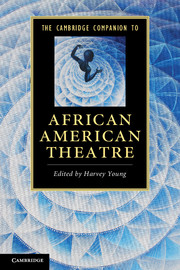Book contents
- Frontmatter
- Contents
- Illustrations
- Contributors
- Acknowledgements
- Chronology
- Introduction
- 1 Slavery, performance, and the design of African American theatre
- 2 Slave rebellions on the national stage
- 3 Early black Americans on Broadway
- 4 Drama in the Harlem Renaissance
- 5 The Negro Little Theatre Movement
- 6 African American women dramatists, 1930–1960
- 7 Amiri Baraka and the Black Arts Movement
- 8 Fragmented musicals and 1970s soul aesthetic
- 9 Spectacles of whiteness from Adrienne Kennedy to Suzan-Lori Parks
- 10 African American performance and community engagement
- 11 Women playwrights who cross cultural borders
- 12 African Diaspora drama
- 13 Black theatre in the age of Obama
- Further reading
- Index
- References
5 - The Negro Little Theatre Movement
Published online by Cambridge University Press: 05 December 2012
- Frontmatter
- Contents
- Illustrations
- Contributors
- Acknowledgements
- Chronology
- Introduction
- 1 Slavery, performance, and the design of African American theatre
- 2 Slave rebellions on the national stage
- 3 Early black Americans on Broadway
- 4 Drama in the Harlem Renaissance
- 5 The Negro Little Theatre Movement
- 6 African American women dramatists, 1930–1960
- 7 Amiri Baraka and the Black Arts Movement
- 8 Fragmented musicals and 1970s soul aesthetic
- 9 Spectacles of whiteness from Adrienne Kennedy to Suzan-Lori Parks
- 10 African American performance and community engagement
- 11 Women playwrights who cross cultural borders
- 12 African Diaspora drama
- 13 Black theatre in the age of Obama
- Further reading
- Index
- References
Summary
On September 17, 1821, a company of actors of African descent performed Shakespeare’s Richard III for an audience of black spectators at New York City’s African Grove pleasure garden. The production was the inaugural offering of the African Theatre, founded by a former merchant seaman named William Alexander Brown. For three years, the African Theatre performed at various venues in New York City. Brown and his troupe sparked the interest of many African American patrons, and aroused curiosity and some hostility among white New Yorkers, before the company quickly disbanded (for reasons that are unclear to historians). This troupe is now celebrated as “the first known black theatre company in North America,” with William A. Brown recognized as “the true father of African American theatre.” The African Theatre introduced New York audiences to the first production of a black playwright’s script (with William A. Brown’s own The Drama of King Shotaway), and to the first African American actors renowned for dramatic acting: James Hewlett and Ira Aldridge.
The African Theatre was the first step in a more far-reaching movement of African American theatre artists and audiences away from mainstream professional activities, toward participation in new venues and situations that they could more readily identify as their own. Despite this important first step, the obstacles facing black theatre artists in America during the 1800s were formidable. White corporate impresarios ruthlessly controlled Broadway and the nation’s major touring circuits. These producers mostly peddled products of proven profitability: melodramas, variety shows, and musical diversions. Within that commercialized landscape, the status of African Americans was marginal. Only falsified, demeaning roles existed for aspiring black actors; opportunities for African American playwrights, directors, and designers were all but unheard of in the professional American theatre.
- Type
- Chapter
- Information
- The Cambridge Companion to African American Theatre , pp. 103 - 117Publisher: Cambridge University PressPrint publication year: 2012
References
- 2
- Cited by

